
If you want to learn how to do keyword research for WordPress blog posts, then you’re certainly in the right post.
Using keyword research can help you discover better content ideas, allowing you to increase traffic and create highly engaging content.
In this article, we will show you how to do keyword research for WordPress blog posts.
Table of Contents
Content authors and search engine optimization (SEO) specialists employ keyword research. It assists you in discovering the terms that people use while browsing for material similar to yours.
When you know what terms people are typing into search engines, you can utilize them to improve your blog entries for SEO. This can increase your traffic from search engines like Google.
Some website owners make the mistake of believing they already know what their target audience is looking for. However, you don’t have to make educated assumptions when there are strong tools available to assist you in making data-driven judgments.
You may use keyword research as part of your WordPress SEO plan to:
That stated, let’s look at how to conduct keyword research for your WordPress site.
We have hand-picked the top keyword research tools that we have personally utilized for our own projects in this post. We’ll go through each tool and see how it can help you do keyword research like a pro.

A great SEO tool is Semrush. There are tools for organic research, paid advertising, keyword research, and competition analysis included in the SEO suite.
The Semrush website is the best place to start. In the field labeled ‘Enter domain, keyword or URL’, type the keyword you want to use.
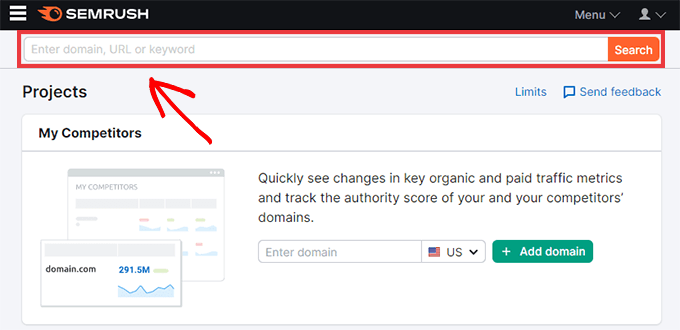
It is okay to use any word or phrase related to your business if you do not already have some keywords in mind. If your eCommerce site sells headphones, for instance, you might find it helpful to start with ‘headphones’.
You can find out lots of information about any keyword you have entered by clicking the ‘Start now’ button.
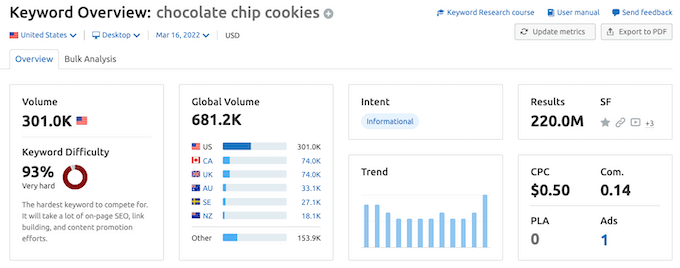
There are three metrics here: CPC for paid advertising, search volume, and search results.
A list of related keywords will appear as you scroll down. Using Semrush’s homepage, you can type in your keyword or phrase and find related search terms.
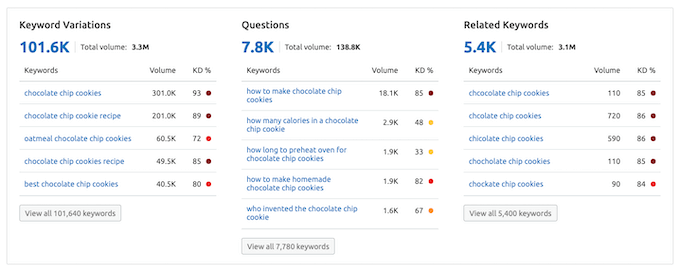
In order to rank for a certain keyword, some websites repeat the same keyword throughout their content. In turn, this reduces the reader’s ability to understand your content.
When Google suspects that you use these tactics, they will penalize your website. Your search engine rankings may suffer as a result.
Search engines can tell you’re writing about a topic thoroughly and genuinely by adding lots of related keywords to your content. To make your content more search engine friendly, use relevant keywords wherever you can.
By clicking the ‘View all…’ button, you will be able to see a comprehensive list of related keywords.
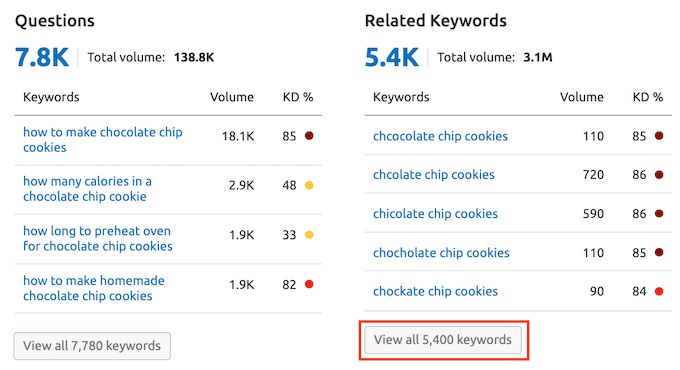
To view the SERP Analysis section, scroll down to the bottom of the page. Search engine results pages, or SERPs, are shown on search engines. When someone searches for a word or phrase in the search engine, this is what is displayed by the search engine.
Search engine results for the keyword that you entered are displayed in the SERP Analysis section.
You will have the strongest competition for this keyword if you want to rank for it.
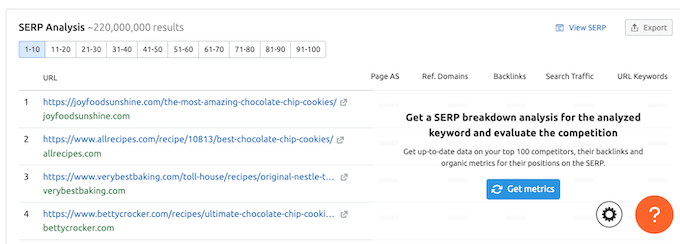
For each result, click the URL to view the detailed Organic Report.
Analyzing this report will give you a better understanding of why this page ranks so highly for the keyword you are searching to find.
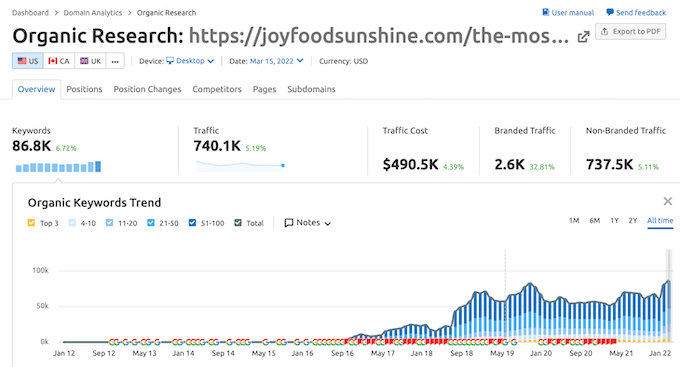
There is a Keyword Magic Tool available on Semrush if you want to find out more about the related keywords. In this way, you can access information on a larger range of related keywords quickly and easily.
Semrush’s sidebar contains a tool called Keyword Magic Tool that you can see in action by clicking it.
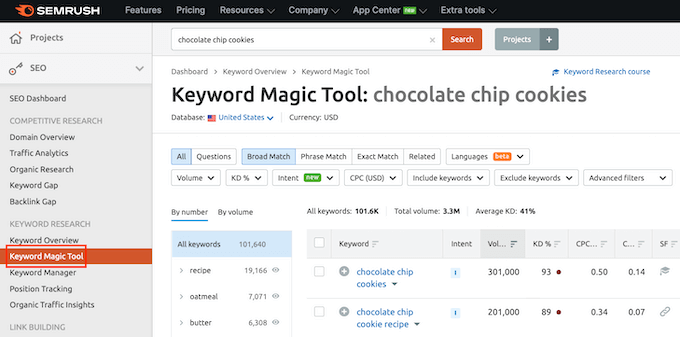
When you come across a keyword that seems promising, click the (+) icon. This will allow you to gain a deeper understanding of the keyword or phrase by using Semrush’s keyword analysis tool.
Following the identification of the most popular keywords, the next step is to analyze their competitors. A keyword with a high search volume and high competition may make it difficult for you to earn a share of the traffic.
When you click on the links that already rank for your chosen keyword, you will see a detailed analysis. In addition, you can see how much traffic this URL receives from search engines, as well as how many backlinks it has, and how many keywords it ranks for.
I strongly recommend Semrush as the best tool available for keyword research. As well as providing keyword ideas, it also helps you determine how to rank for them.

The Ahrefs keyword research tool is arguably the most powerful available on the market today. In search results, this tool helps you find out why your competitors are ranking so high, and how you can outrank them.
The Ahrefs index contains more than 22 trillion links from more than 170 domain names from over 6 billion pages crawled every day. It’s impressive how much data Ahrefs provides, but the real beauty lies in how you can use this data to research keywords.
Using Ahrefs’ user-friendly interface, you can sort this data into different categories. Ahrefs displays a wealth of information in an easy-to-understand format when you enter a domain name in the search field.
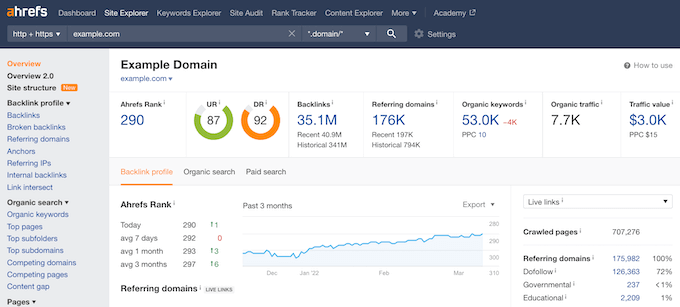
In order to get started, Ahfres gives you a quick overview of the domain’s details. Content reviews, organic keywords, and backlinks are all included in this calculation. Please click on one of these sections for more information.
There are many things to discover. It is helpful to look at the ‘Organic Keywords’ report. This displays all of the keywords for the domain name, along with their search volume, rank, and URL.
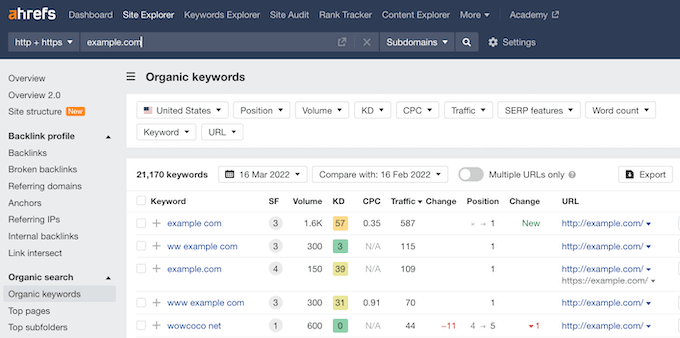
Start by entering some phrases or words into the search box if you want to generate some keyword ideas. This might be anything from the name of your best-selling product to a new industry phrase.
The keyword explorer tool in Ahrefs will then create a list of keyword ideas, including search volume, difficulty score, and clicks. We suggest looking for keywords with a high search volume but a low difficulty score.
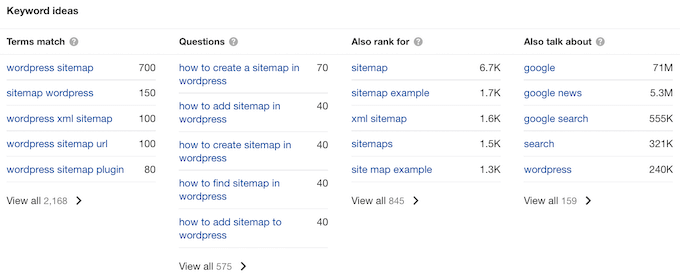
Ahrefs also includes strong tools for content analysis, rank tracking, and site monitoring, among other things. All reports may be exported in CSV or PDF format and then edited in your preferred spreadsheet program.

AnswerThePublic is a free tool for visual keyword research and article inspiration. It takes advantage of Google and Bing’s auto-suggest technologies to deliver facts in an easier-to-understand style.
To begin, go to the AnswerThePublic website and input a term or phrase. The program will then load relevant keywords and display them in the form of a visual map.

When you click on a keyword, AnswerThePublic will open a new browser tab with the results of that keyword’s Google search. This is a simple technique to investigate the questions that people are looking for so that you may generate content that addresses those queries.
All of AnswerThePublic’s keyword research is presented on a single page. You may also save this information as pictures.
Another alternative is to export the data from AnswerThePublic to a CSV file. You may then investigate this information using your favorite spreadsheet software.

All of the tools listed above will give you a plethora of information.
If you’re not sure where to begin, here are some pointers on how to select keywords that will drive a lot of traffic to your website.
Finding the optimal search phrases on the first try is not the goal of keyword research.
After all, it’s called research for a reason!
It is frequently best, to begin with broad, ambiguous search phrases. This might be the name of your goods, company, or major industry subjects.
You may then go through the results and narrow down your possible keywords. If you’re using Rank Math, you may simply locate relevant keywords by using the Additional Keys tool.
The search volume and trends for these associated terms and phrases may then be viewed. This can assist you in discovering new keywords that have the potential to drive a large volume of high-converting, laser-focused traffic to your website.
Competitor research is the process of analyzing your own keyword performance and comparing it to that of your competitors using a tool.
Some tools can even assist you in identifying possibilities to surpass your competition. The Semrush sidebar, for example, has an entire section dedicated to competition research.
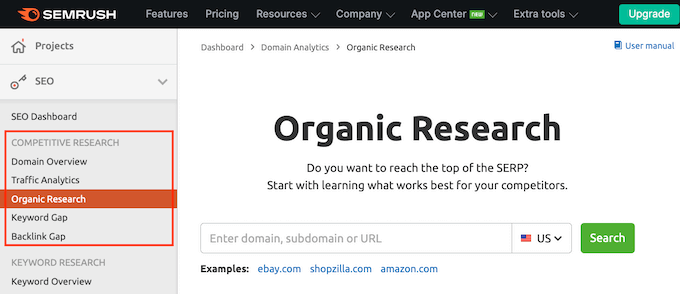
The search intent is what the user planned to accomplish by looking for this specific keyword.
Some keywords have a distinct search purpose. Others are a little hazier.
Assume someone enters “burrito” through a search engine. This individual may be looking for a burrito recipe or ordering takeout. They could even be seeking a definition of the term “burrito.”
The search purpose is ambiguous. Even if you rank for this term, you may find it difficult to develop content that fits the visitor’s search intent. This is due to the fact that there are several alternative search intentions for the phrase ‘burrito.’
Consider the search term ‘best vegetarian burrito recipe.’ The search aim is considerably clearer here.
Although there are fewer individuals looking for this term, it is easy to develop content that precisely fits the search intent.
When conducting keyword research, there is always the desire to choose broad search phrases with high search traffic.
However, it is critical to remember the search aim.
The primary purpose of keyword research is to discover what your clients are looking for and then rank those terms in search results. Depending on your content strategy, there are several approaches you may use.
To begin, develop a solid content marketing strategy centered on the keywords you wish to target. This might entail writing helpful content articles, blog posts, infographics, and videos for this term.
Businesses may use their new keywords to develop landing pages, manuals, FAQs, and other material.
Did your keyword research beneficial? Is your search engine traffic increasing, or do you still have more work to do?
If you want to answer these questions, you’ll need to keep track of your progress.
You must first sign up for Google Search Console. This tool gives information on how Google perceives your website. You may also use Google Search Console to monitor your term rankings and average position in search results.
You’ll need to install Google Analytics to your WordPress website to effectively measure the performance of your content.
We hope this post was useful to get a full insight into how you can do keyword research for WordPress blog posts. If you’re an enthusiast about WordPress, then you may take a look at how you can uninstall and delete a WordPress theme, also you look at this guide on how to set up WooCommerce on WordPress if you wish to make an e-commerce website using WordPress.
If you like this post, be with ThemeLooks and subscribe to our WordPress video tutorials on YouTube. We may also be found on Twitter, LinkedIn, and Facebook.